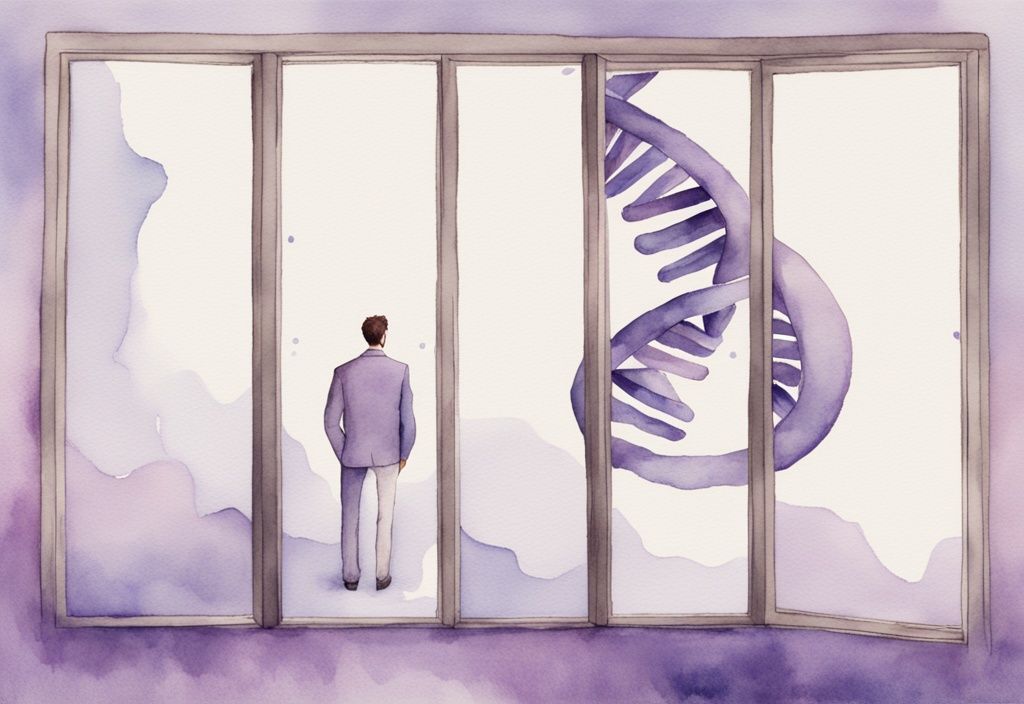Understanding the Alcoholic Narcissist: Causes and Coping Mechanisms
Has your life been touched by an alcoholic narcissist? Are the intertwining difficulties of an insatiable craving for alcohol and excessive self-importance creating tension in your relationships? You are not alone. Many individuals are grappling with the same plight, often finding themselves swept away in the tempestuous waves of this complex personality disorder.
This article serves as an invaluable guide through the convoluted maze of alcoholic narcissism. It will take you on a probing journey to unearth the entrenched behaviors, revealing the profound impact on personal and social life.
But it doesn’t just end there. You’ll also gain valuable insights on how best to navigate these situations and discover comprehensive, empathetic strategies to foster the path towards recovery. You came here seeking understanding, and you will find it.
What is an Alcoholic Narcissist?
Definition and Overview
An alcoholic narcissist is a person who grapples with both narcissistic personality traits and a dependency on alcohol. This term fuses the psychological dimensions of narcissism with the physiological and behavioral facets of alcohol addiction, creating a multifaceted and often detrimental condition.
Narcissism encompasses characteristics like grandiosity, an insatiable need for admiration, a lack of empathy, and an elevated sense of self-importance. Those with narcissistic tendencies often find it challenging to see beyond their own perspectives and may engage in behaviors that elevate their status at the expense of others.
Alcohol dependency is marked by an inability to control drinking, heightened tolerance, intense cravings, and neglect of personal and professional duties. This dependency not only undermines an individual’s health but also wreaks havoc on their relationships and daily functioning.
When Narcissistic Personality Disorder (NPD) coexists with Alcohol Use Disorder (AUD), it substantially complicates treatment efforts and markedly reduces the quality of life. This dual diagnosis necessitates a thoughtful and comprehensive approach to address both issues effectively.
Key Characteristics
Narcissistic Personality Traits
Individuals showcasing narcissistic personality traits typically manifest behaviors characterized by:
- Grandiosity and a sense of superiority: Believing they are superior to others and deserving of special treatment.
- A constant need for admiration and validation: Seeking continual approval and validation to boost their self-esteem.
- Lack of empathy: Struggling to recognize or understand others’ feelings and needs.
- Behaviors such as selfishness, emotional unpredictability, and hypersensitivity: Reacting intensely to perceived criticism and potentially acting impulsively.
- Two forms of narcissism:
- Grandiose: High self-esteem and assertiveness.
- Vulnerable: Low self-esteem, defensiveness, and avoidance behaviors.
Alcohol Dependency Traits
Traits common to alcohol dependency include:
- Inability to limit alcohol intake: Continuing to drink despite the knowledge of adverse consequences.
- Increased tolerance: Needing more alcohol to achieve the same effects, leading to higher consumption.
- Strong cravings: Persistent preoccupation with alcohol that often overshadows other thoughts.
- Neglect of responsibilities: Failing to fulfill personal and professional duties due to drinking habits.
- Withdrawal symptoms: Experiencing physical and psychological distress when not consuming alcohol.
Link Between Narcissism and Alcoholism
Co-occurrence of NPD and AUD
The simultaneous presence of Narcissistic Personality Disorder (NPD) and Alcohol Use Disorder (AUD) brings immense struggles. Imagine facing the world with the compounded weight of both disorders. Research reveals a striking 31.3% of people diagnosed with NPD also grapple with substance use disorders, including alcoholism. This high co-occurrence rate underscores a tangled interplay where one disorder intensifies the symptoms and behaviors of the other. Both conditions exhibit avoidant behaviors, emotional instability, and relational upheavals. When combined, these traits intensify, creating a perfect storm. Grasping these overlapping characteristics is vital to crafting effective, integrated treatment strategies for those navigating the murky waters of both disorders.
How Alcohol Exacerbates Narcissistic Traits
Alcohol magnifies narcissistic traits like gasoline on a fire.
Those with NPD may find their grandiose, entitled, and domineering behaviors amplified under the influence. Can you picture the scene: an already volatile person becoming aggressively manipulative after a few drinks? It’s a troubling reality. Alcohol reduces inhibitions and heightens self-importance, deteriorating their judgment and increasing the craving for admiration. This spiral leads to more severe interpersonal conflicts and emotional breakdowns, leaving a trail of damaged relationships in its wake. Thus, alcohol acts as a catalyst, bringing out the worst in a narcissist’s behavior.
Why Narcissists Turn to Alcohol
For an alcoholic narcissist, alcohol is more than a beverage; it’s a sanctuary. It bolsters their inflated self-image and provides an escape from lingering insecurities and unresolved trauma. Imagine the temporary relief that comes from the numbing effect of alcohol. It’s a false refuge from the emotional torment they are either unable or unwilling to confront. As they drink, they momentarily dodge the exhausting demands for validation and admiration. This escapism helps them cope with their inner turmoil, though it’s a fleeting and ultimately destructive solace. Recognizing this, it’s clear why many narcissists reach for the bottle as a means to stave off their deeper psychological struggles.

The Psychological and Social Impact of an Alcoholic Narcissist
Alcoholic narcissists can wreak havoc on all aspects of their lives and the lives of those around them. From personal relationships to legal and financial repercussions, their behavior inflicts deep and lasting damage. Here we delve into the multifaceted impacts of living with or being an alcoholic narcissist.
Impact on Personal Relationships
Emotional Abuse and Manipulation
Imagine a puppet master pulling the strings, creating a volatile world of emotional highs and lows. The alcoholic narcissist uses deceit and manipulation to ensnare loved ones. This web of control leads to a toxic environment where emotional abuse is not just a tactic but a constant, suffocating presence.
Effect on Family and Friends
The lives of family members are marred by stress and anxiety, forever living in the shadow of the alcoholic narcissist’s unpredictable and quarrelsome behavior. Friends, too, often find themselves pulling away. The relentless self-centeredness and erratic actions present a burden too heavy to bear, leading to isolation and fractured friendships.
Impact on Children
Children, the innocent casualties, endure a storm of emotional, psychological, and sometimes physical abuse. The long-lasting trauma stemming from such a detrimental environment demands therapy and structured interventions. These young minds grapple with torment and confusion, often carrying scars that shape their future psychological well-being.
Personal Distress and Quality of Life
Envision a labyrinth where every turn leads to a dead-end of emptiness, insecurity, and dissatisfaction. The personal life of an alcoholic narcissist is just that, a relentless struggle to form and maintain healthy relationships. These ongoing battles amplify their inner turmoil, diminishing their quality of life and entangling them in a web of legal and financial woes.
Legal and Financial Repercussions
For the alcoholic narcissist, legal troubles are common companions. DUIs, custody battles, and endless relational conflicts mark their path. Financial instability follows closely behind, driven by irresponsible behavior, impulsive spending, and mounting fines. These cascading issues erode their stability, further fueling the cycle of personal and relational turmoil.
Treatment Challenges and Approaches
Addressing the treatment of an alcoholic narcissist is a multifaceted endeavor. This section explores various therapeutic approaches and the importance of integrated treatment plans, offering a comprehensive understanding of managing Narcissistic Personality Disorder (NPD) alongside Alcohol Use Disorder (AUD). The discussion will cover the complexities of dual diagnoses, standard treatment methods, and the vital role of support groups.
The Complexity of Dual Diagnosis
Treating an alcoholic narcissist poses unique challenges due to the dual nature of NPD and AUD. Overlapping symptoms such as emotional instability and relational difficulties often complicate the treatment journey. Precision in diagnosis according to DSM-5 criteria is crucial, with only qualified mental health professionals able to make formal diagnoses. A comprehensive, integrated approach becomes essential to effectively address these intertwined disorders.
Standard Treatment Methods
Cognitive Behavioral Therapy (CBT)
For an alcoholic narcissist, Cognitive Behavioral Therapy stands as a cornerstone of treatment. This therapeutic approach dives deep into identifying and changing dysfunctional thoughts and behaviors. Through CBT, individuals develop healthier coping strategies and enhance their self-awareness.
Imagine your thoughts as the roots of a tree—nourishing all aspects of your being. By nurturing healthier roots, CBT helps in understanding the intricate connections between thoughts, emotions, and actions, paving the way for substantial behavioral change.
Dialectical Behavior Therapy (DBT)
Dialectical Behavior Therapy melds cognitive-behavioral techniques with mindfulness practices, offering robust ways to manage the emotional turbulence often seen in alcoholic narcissists. DBT enhances interpersonal skills by teaching emotional regulation, distress tolerance, and effective communication.
Think of DBT as a bridge, balancing acceptance and change. It fosters a more adaptable and resilient mindset, aiding individuals in navigating the complexities of dual diagnoses.
Dynamic Deconstructive Therapy
Dynamic Deconstructive Therapy excels in unraveling the intricate layers of narcissistic and addictive behaviors characteristic of an alcoholic narcissist. It encourages deep emotional processing and the development of healthier behavior patterns.
Envision this therapy as an archaeologist meticulously uncovering layers of history. By exploring the root causes of conditions, Dynamic Deconstructive Therapy aims for profound and sustainable changes.
Integrated Treatment Plans for NPD and AUD
For effectively treating an alcoholic narcissist, integrated treatment plans are pivotal. These plans often involve a mix of individual therapy, group counseling, and, at times, medication to tackle both NPD and AUD concurrently. By focusing on the interconnection between narcissistic traits and alcohol dependence, personalized treatment strategies can be crafted.
This coordinated care approach ensures a holistic addressing of all aspects of the individual’s mental health, fostering better outcomes and promoting overall well-being.
Role of Support Groups and Peer Support
Support groups are vital in the recovery process of an alcoholic narcissist. Engaging in groups such as Alcoholics Anonymous (AA) aids in maintaining sobriety by connecting individuals with similar experiences. Peer support groups specific to dual diagnoses offer mutual understanding, encouragement, and practical advice.
These groups create a comforting community, providing a safe space for sharing struggles and triumphs. They underscore the importance of community in one’s journey towards recovery, reinforcing that no one has to face these challenges alone.
The Role of Family and Friends in Recovery
Understanding the role of family and friends in the recovery process of an alcoholic narcissist is crucial. Their support can significantly impact the journey to sobriety and mental well-being.
Providing Support and Setting Boundaries
- Emotional Support: Families play a vital role in offering emotional support to an alcoholic narcissist. This involves empathetic listening while standing firm against manipulative behaviors. Picture a compassionate yet resolute stance, where love does not equate to endorsement of negative actions.
- Clear Boundaries: Establishing clear boundaries is essential to prevent enabling self-destructive behaviors. This means defining acceptable behaviors and protecting your mental health. Think of it as drawing lines in the sand, clear and unwavering.
- Open Communication: Encourage open and honest dialogue. Addressing issues directly without emotional manipulation can be likened to clearing a foggy path, making the journey smoother for all involved.
- Limits on Enabling: Enabling behavior can worsen the situation. Families should set limits to avoid actions that indirectly support the alcoholic narcissist’s habits. Visualize these limits as guardrails that keep everyone on the path to recovery.
- Consistency: Consistency in enforcing boundaries helps maintain a safe environment, demonstrating that support does not mean condoning negative behaviors. Imagine consistency as a sturdy bridge, steady and reliable, spanning rocky waters.

Encouraging Professional Help
- Advocacy: Advocating for professional treatment is one of the most crucial roles family and friends can play. Encouraging the alcoholic narcissist to seek help from therapists, counselors, or rehab programs is akin to showing them a lighthouse in a storm.
- Researching Treatment Options: Assisting in finding reputable treatment programs and professionals can reduce the overwhelm for the alcoholic narcissist. Think of it as providing a map in uncharted territories.
- Commitment to Treatment: Helping them stay committed to their treatment plan involves regular check-ins, providing transportation, and encouraging attendance at therapy sessions or support groups. Consider this commitment as the steady beat of a drum, keeping pace in the recovery journey.
- Positive Reinforcement: Offering positive reinforcement for attending sessions or making healthy choices can motivate the alcoholic narcissist to continue their recovery. Imagine these reinforcements as gentle nudges, guiding them towards a healthier path.
- Education: Educating yourself about NPD and AUD helps you understand the challenges faced by your loved one, fostering a more supportive environment. Picture this education as the torchlight illuminating the complexities of these conditions.
Support Systems for Family and Friends
- Al-Anon: Joining support groups like Al-Anon connects you with others facing similar challenges. It offers a chance for mutual support and guidance, like finding a community of fellow travelers on a difficult journey.
- Therapy: Engaging in individual or family therapy helps manage the emotional impact of dealing with an alcoholic narcissist. Professional guidance can be a lifeline, providing coping strategies and emotional relief, much like a counselor at the end of a dark tunnel.
- Self-Care: Prioritizing your own self-care is essential. Regular exercise, healthy eating, and hobbies can help you maintain your well-being. Imagine self-care as the oxygen mask you put on yourself to help others more effectively.
- Educational Programs: Participating in educational programs or workshops on narcissism and alcoholism increases understanding and offers practical tools for managing relational dynamics. Picture these programs as blueprints for navigating complex relationships.
- Building a Support Network: Creating a network of friends, support groups, and therapists ensures you are not isolated and have access to the emotional support needed. Think of this network as a safety net, catching you during tough times.
Strategies for Long-Term Recovery
Navigating the path to recovery from both alcohol dependency and narcissistic traits requires a multifaceted approach. These strategies provide a roadmap for long-term healing, emphasizing the necessity of ongoing support, diligent monitoring, and comprehensive recovery plans.
The Need for Ongoing Support
For an alcoholic narcissist, continuous support is crucial in maintaining long-term recovery. Imagine this support as the sturdy framework of a house, each component playing a vital role:
- Therapy: Think of therapy sessions as the solid foundation. Regular interactions with a therapist can delve into the core issues of narcissism and alcohol dependency. This safe space allows exploration and resolution of deep-seated personal challenges.
- Support Groups: These groups are the walls that hold everything together—whether it’s Alcoholics Anonymous (AA) or specific groups for narcissistic behavior. Participating in these communities brings encouragement and accountability.
- Family Involvement: Family members are the beams and pillars, offering the emotional support that reinforces your structure. Their involvement helps maintain treatment adherence, encouraging healthy behaviors and assisting during rough patches.
- Regular Follow-Ups: Think of these follow-ups as the regular maintenance checks. Consistent interactions with mental health professionals ensure that your treatment plan remains effective and evolves with your progress.
Monitoring and Prevention of Relapse
Preventing relapse for an alcoholic narcissist is akin to maintaining a well-oiled machine. Proactive strategies are integral to this process:
- Regular Monitoring: Continuous observation by healthcare providers, combined with self-monitoring, helps catch early signs of relapse. Prompt action at these signs prevents larger issues from developing.
- Structured Programs: Structured relapse prevention programs offer tailored support. These programs, like a finely tuned ensemble, harmonize both individual and group efforts to sustain sobriety and manage triggers.
- Developing Coping Mechanisms: Developing robust coping strategies is like having a reliable toolkit for life’s stressors. Practices such as mindfulness, stress management exercises, and cognitive-behavioral techniques fortify your resilience.
- Emergency Plans: Having a clear plan for emergency intervention is essential. It’s similar to having a fire escape plan—swift action at the first hint of relapse ensures you stay on track.
Comprehensive Recovery Plans
A well-rounded recovery plan is essential for an alcoholic narcissist. These plans offer the structure and support necessary for enduring recovery, combining detoxification, structured treatment programs, and aftercare.
Detoxification
The initial phase of recovery involves detoxification, a crucial step for an alcoholic narcissist:
- Supervised Detox: Opting for supervised detox provides a safe environment where withdrawal symptoms are managed effectively. Think of it as having a safety net during a turbulent journey.
- Medical Support: Healthcare professionals administer medications and provide supportive care, easing the detox process and ensuring safety and comfort.
- Psychiatric Evaluation: A thorough evaluation identifies any co-occurring mental health issues, ensuring these are addressed alongside alcohol dependency.
Inpatient and Outpatient Treatment Programs
Following detoxification, structured treatment programs become the cornerstone of long-term recovery:
- Inpatient Programs: These provide round-the-clock care in a controlled setting, offering various therapeutic interventions aimed at addressing both alcohol dependency and narcissistic traits.
- Outpatient Programs: Balancing treatment with daily responsibilities, outpatient programs offer flexibility while still providing comprehensive therapy and support.
Aftercare Programs
Aftercare programs are vital for the transition back to daily life and maintaining recovery:
- Sober Living Homes: These transitional living spaces provide a supportive environment where individuals can focus on sobriety while gradually reintegrating into regular life.
- Ongoing Therapy: Continuous engagement with therapeutic services reinforces skills learned during initial treatment and addresses any emerging issues.
- Support Groups: Regular participation in support group meetings ensures ongoing communal support and accountability.

Conclusion
Summarize the Importance of Understanding the Intricate Relationship Between Narcissism and Alcoholism
Understanding the complex interplay between narcissism and alcoholism is crucial for effective treatment and support. An alcoholic narcissist, defined by a blend of narcissistic traits and alcohol dependency, faces unique challenges that intertwine and amplify each other. This dual presence makes both identification and treatment more complicated and demands a nuanced approach that considers both conditions simultaneously.
A holistic perspective that comprehensively explores these interrelated issues promotes awareness and reduces stigma. By delving into the synergy between narcissism and alcoholism, we pave the way for more effective treatment strategies that can significantly improve outcomes for those affected.
Emphasize the Necessity for Comprehensive and Integrated Treatment Plans
Addressing the dual challenge of narcissistic personality disorder (NPD) and alcohol use disorder (AUD) requires a multifaceted treatment plan. Effective strategies must tackle both issues concurrently.
Treatment modalities like Cognitive Behavioral Therapy (CBT), Dialectical Behavior Therapy (DBT), and Dynamic Deconstructive Therapy offer targeted support for managing complex behavioral patterns associated with both conditions. Integrated treatment plans should also include medical interventions, peer support, and continuous monitoring to ensure lasting recovery. Such comprehensive plans are essential for breaking the cycle of dependency and narcissism, offering a holistic path to mental health and well-being.
Highlight the Critical Role of Ongoing Support from Family, Friends, and Professionals in Achieving Long-Term Recovery
The role of family, friends, and mental health professionals cannot be overstated in the journey to recovery for an alcoholic narcissist. Their ongoing support is pivotal in maintaining sobriety and healthy behavior patterns.
Families and friends provide emotional backing while establishing firm boundaries to safeguard their well-being. Mental health professionals offer structured therapy and essential tools for coping and self-awareness. Together, they create a robust support system that encourages accountability and fosters a sense of hope, making long-term recovery a realistic and attainable goal.
By acknowledging these critical aspects, we can better navigate the complicated landscape of narcissism and alcoholism, ultimately leading to more effective support systems and therapeutic outcomes for those affected.
FAQ
What is an alcoholic narcissist?
- An alcoholic narcissist is an individual exhibiting both narcissistic personality traits and a dependency on alcohol. This dual diagnosis complicates their behavior, making it more difficult to navigate their personal relationships and treatment processes.
How does narcissistic personality disorder relate to alcohol use disorder?
- Narcissistic Personality Disorder (NPD) and Alcohol Use Disorder (AUD) often coexist, intertwining harmful behaviors and making treatment efforts more challenging. This overlap can reinforce negative patterns, trapping the individual in a destructive cycle that requires comprehensive treatment.
What are common behaviors of an alcoholic narcissist?
- Denial of alcohol problems
- Manipulation and emotional abuse
- Grandiosity and lack of empathy
- Blaming others for personal issues
Elena Hartley notes that these behaviors often stem from deep-seated insecurities and an overwhelming need for control, which alcohol temporarily assuages but ultimately exacerbates.
How can family and friends help an alcoholic narcissist?
Supporting an alcoholic narcissist can be incredibly challenging, but there are crucial steps loved ones can take:
- Providing empathetic yet firm emotional support
- Setting clear and consistent boundaries
- Encouraging professional treatment, highlighting the benefits of dual-diagnosis programs
- Seeking help through support groups like Al-Anon, which can offer valuable resources and community
Elena emphasizes that while compassion is essential, maintaining one’s own mental and emotional health is equally important.
Why is treating both NPD and AUD together important?
- Tackling both NPD and AUD concurrently is vital because their symptoms and behaviors are deeply intertwined. Addressing one without the other can lead to incomplete recovery, whereas a holistic approach enhances the effectiveness and sustainability of treatment.
What treatment options are available for alcoholic narcissists?
There are several treatment modalities designed specifically for individuals grappling with both NPD and AUD:
- Cognitive Behavioral Therapy (CBT)
- Dialectical Behavior Therapy (DBT)
- Dynamic Deconstructive Therapy
- Support groups tailored to dual diagnoses
- Medication management
- Dual-diagnosis rehabilitation programs
Elena advises that the combination of therapy, medication, and community support creates a robust framework for recovery.
Can someone recover from being an alcoholic narcissist?
- Yes, recovery is possible with comprehensive treatment and ongoing support systems. Continuous monitoring and a strong network of support are critical for maintaining a healthier and more balanced life, both emotionally and physically.
In Elena’s words, “Recovery is a journey that thrives on patience, persistence, and an unyielding belief in the possibility of a better future.”














Post Comment